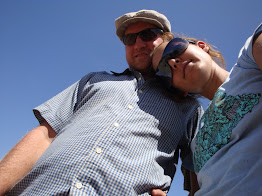A baboon attacked Monster. Apparently, Bucket experienced the same fate while we were in the U.S. though he shows no signs of this history. Our non-vet diagnosis was certain death. She couldn’t lick her wounds because they were on her neck and she didn’t care for us to try and wash them either. Infection seemed inevitable, but each morning Monster would greet us looking slightly better than the day before. I’m not sure if Bucket tried to help or not, he seemed worthless whenever I saw the two of them together. Six days later all her wounds had closed up and we were celebrating the amazing recovery of this mnyama (animal). Then on the seventh day a snake bit her. Another non-vet diagnose – though it was surely a poison of some kind. Whining outside our tent and unable to walk, she appeared to find the sensation in her face very peculiar. I prepared myself for another good-bye to Monster and just when I thought each struggled breath would be her last, Paul came home and the sound of the car stirred in her an energy fueling her enough to get up and go to greet him. She fell over once she got to the truck, but then hobbled to the kitchen tent and drank some water and ate some food. We are stuck in Nairobi with a broken clutch so I can’t report on her condition right now - if you hear nothing else of her you can assume the nature of things. I’m told that she won’t necessarily die from snakebite - it would depend on which snake and where it bit her.
We’ve located 5 of the 6 collared animals - Mwanzo threw us a welcoming party by leading us into a mud pit. Two hours later, our lion got impatient with us and moved out of range. Three hours later we managed to dig ourselves out. The mud was thick clay and every once and a while we would dig up a scorpion in our efforts to be free. We were careful about this during hours one and two – by hour three we were scooping up mud by hand and waiting for a sting, which never came. Always prepared to sleep in the car if we must, being stuck is an annoyance, but not a fear. Though the movements and protection of the truck give you an invincibility that sheds itself once this convenience is taken away. On our victory drive back, two hyenas ran straight through camp. If this keeps up we won’t need this convenient truck anymore because we won’t have to leave the premises – our study animals keep wandering by. We aren’t the only ones they have been gracing with their presence, in our absence a group of lions attacked four bomas and ate about 12 goats. This doesn’t make people very happy.
Day jobs, night jobs - whichever way you want to look at it – Paul and I might be quitting ours soon. We had our fifteen minutes of fame by playing tourists at Sampu camp for a promotional video for ACC. An Italian filmmaker with a flare for being all things Italian directed us for our minor role in this film. Our voices won’t be heard so we were told to chat about anything and then pick up the binoculars and pretend to look at something. I haven’t seen the edited clip so I can’t report on our acting skills - I’m sure they were superb. I’ve also made the Social Scene of the Kenyan newspaper – a picture of Sam and I taken at Dr. Western’s awards ceremony. Pretty soon I’ll probably be a movie star – 30 is a good age to start down that path right?






.jpg)




